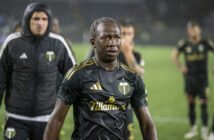
Toye signed Pele but would not have brought Beckham
Photo: Jenni Connor and Rick Morrison
Part 1 of Clive Toye’s interview with Conor Brennan, “Fans are delighted the old NASL names, Sounders, Timbers, Whitecaps and Quakes were saved“, sparked significant reaction.
Many disagreed with Toye’s characterisation with the relative influences of NASL and MLS, none more so than Simon Allen who abandoned his prepared script on his World Wide Soccer podcast, to devote the entire second half of the show to deconstructing Toye’s opinions. Passionately.
If you missed Brennan’s introductory article to the role Clive Toye played in developing soccer in North America, please read: Conor Brennan introduced younger readers to Clive Toye,
In Part 2 of Brennan’s interview with Clive Toye, the American Soccer Pioneer, he talks about his new book, David Beckham and the American attitude towards being a global sport during that era.
Conor Brennan: In your time, you signed Pele and Beckenbauer, Johann Cryuff was playing in the league as well, many stars in their prime or just after their prime. George Best also comes to mind. David Beckham. Would he have been a player you would have signed?
Clive Toye: How can I put it? (Laughs)……I’m often reminded of a quote from George Best who was a great player. And true or not, it was a quote that he was alleged to have made, “David Beckham, can’t use his left foot, can’t dribble, can’t tackle, can’t head the ball, but apart from that he’s not a bad player”.
So, would I have bothered to sign David Beckham? Absolutely no, under any circumstances, whatsoever. He’s not a very good player; he never was a very good player, in my opinion. He’s got a very accurate right foot, and that’s it. He spends most of his time now posturing with other celebrities, et cetera, to get his picture in the paper and sell underwear. So, no!
Conor Brennan: I suspect that the Galaxy, or the MLS as it would have been, took the decision that they needed to raise the profile of the game, and Beckham was probably one of the two or three most famous players in the world when signed. And I think they went for the marquee rather than the football.
Clive Toye: Oh, there’s no question at all. They went for the name, because there he was with his wife and his celebrity and all the rest of it. But did he attract soccer fans? Did he play many games where soccer fans could see him? If people turned up because of his name and now they wanted to see this huge name play soccer, they’d have gone away saying, ‘what was that all about?’.

Some Red Bulls fans poke fun at Beckham’s other career as an underwear model. Mike Magee isn’t distracted.
Photo: Scott Marsh
Because there were better players that were in the team before. Maybe I’m biased…well, of course I’m biased…I would have much rather spent money on Ronaldinho. He is a personality, he actually plays, a lot, and I would pay 20 bucks to go see him play because he’s a very, very attractive player.
Conor Brennan: Clive, one of the reasons we’re here to day is to discuss your new book, “Toby And The Greatest Game”. Does David Beckham make an appearance in your book?
Clive Toye: (Long pause). Now that’s a very rude question! No, he doesn’t. Lots of players make an appearance in the book; lots of players you never heard of make an appearance in the book. It’s a story of this magical ball that appears out of a computer one day by chance and is the ball. It’s part of every ball that’s ever been kicked playing soccer. It takes these kids, one by one and sometimes in groups, all over the world, both in present times and previous times, and introduces them to all parts of the game in all parts of the world.
They can understand then that if aliens pick me up and drop me anywhere in the world, I’ll find someone just like myself who likes playing soccer. At the same time, they learn a bit about the history; for example, they go to Brazil in 1914 to watch Brazil’s first ever game which happens to be against Exeter City, so I get Exeter City into the book, which, as you well know, is the team I’ve always supported.
Toby takes the kids back to Wembley in 1966 and asks them, as he was the ball, when Geoff Hurst hit the crossbar, would they, the kids, really like to know now the real truth? Did he, Toby, cross the line? There’s a big secret and they talk about it and he says, ‘ok, I’ll tell you’, he said. ‘It must have crossed the line, just look at the score!’
And so, all kinds of things happen with the kids, but all the time Toby is being sought by an evil man who lives on the Mountain Of Greed in the middle of Europe and whose name is Joe Seff. Anyone who thinks that may have something to do with FIFA and its president Joseph Blatter, I mean, well, if they want to think that way, well, their minds are as warped as mine!
The fact that a penniless, shoeless kid from Mozambique can end up with a statue of himself outside the Stadio da Luz in Lisbon, Eusebio of course; and a little kid of five foot three or whatever he is can end up being the best player of the present day, Lionel Messi and no matter who you are, where you are, how tall you are, how short you are, boy, girl whatever, your game is everywhere in the entire world.
Conor Brennan: Why a children’s book? Was it to explain the game to young kids?
Clive Toye: No, it explains the world, the world of soccer to young kids. Not the laws of the game, not how to play the game, not how to kick a ball, but how the game is everywhere. How the game is in every part of the globe and every kid has the same chance they have to play soccer and they will find that if they’re dropped in Alaska or they’re dropped in Tierra del Fuego, they’ll find, if they go out on the street and look around, they’ll be somebody kicking a soccer ball.

Toye’s book has a cover as colourful as the author
Someone just like themselves and they can have friends, despite all the enmities they are in the world, it’s easy to get friends from soccer. There’s no better way of getting friends than through soccer, no better way than finding out about the rest of the world than through soccer.
Conor Brennan: Is that an oblique acknowledgement that there’s a certain insularity about the USA about its sports not being aware of the international aspect?
Clive Toye: Well, that’s a part. But I didn’t write this as an opposition to other American sports, simply producing the facts and the fun and the excitement and the mystery of soccer.
It would be impossible to write such a book about the American sports because once they get to the shoreline, they drop off and that’s the end of it.
In fact, I wrote about that in my other book, “A Kick In The Grass”. You’ll laugh at this. In Baltimore in ’67, the first year of the league, I was general manager of Baltimore Bays and we reached the championship game.
One of the local journalists, a very nice fella, said to me, ‘if you win, if you beat the Oakland Clippers, does this mean that you’re world champions?’ And I said, ‘Ken, I hate to tell you this, but there’s two hundred and odd other countries playing this game and a lot of them are better than us! We’re not world champions of anything.’
That American mentality that, who is it, the Knicks or Giants – I don’t know who they are, I don’t pay any attention to those sports – are world champions? It’s ludicrous because nobody else is competing with them. I can invent a game throwing my socks at the wall and say, ‘that’s it! I’m the world champion!’, because no one else is playing that game.
In Part 3, Toye talks about being called a ‘Communist’ for being a soccer fan.
![Prost International [PINT]](https://prostinternational.com/wp-content/uploads/2021/08/PINTtFontLogoRoboto1536x78.jpg)



1 Comment
Clive Toye makes some interesting and truthful points but when he talks about Beckham and celebrity the same thing was happening to the Cosmos and their visits to Studio 54. The movie ONCE IN A LIFETIME the story of the New York Cosmos shows this in great detail. I enjoyed the old NASL but MLS has moved on from those days as have the American soccer fans..